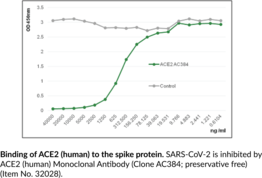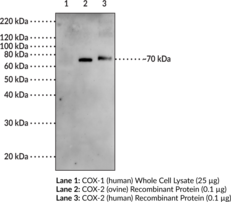Description
Angiotensin-converting enzyme 2 (ACE2) is a carboxypeptidase and homolog of ACE1 that is encoded by ACE2 in humans.{53456,53457} It is a type I transmembrane protein composed of a cytoplasmic tail and an extracellular domain containing an HEMGH motif, characteristic of zinc-metallopeptidases, which exhibits carboxymonopeptidase activity.{53456} ACE2 is expressed in vascular endothelial cells where it catalyzes the conversion of angiotensin I to angiotensin 1-9, a peptide of unknown function, and angiotensin II to the vasodilatory peptide angiotensin 1-7 to regulate systemic blood pressure.{53456,53457} It is also expressed in the epithelial cells of the kidney, heart, lung, small intestine, and liver and has roles in fluid homeostasis, cardiac contractility, and amino acid absorption, as well as the prevention of pulmonary fibrosis and hypertension. ACE2 also acts as a functional receptor for severe acute respiratory syndrome coronavirus (SARS-CoV) and SARS-CoV-2 to facilitate viral entry into host cells.{49542,53458} Cayman’s ACE2 (human) Monoclonal Antibody (Clone AC384; preservative free) can be used for ELISA and Western blot (WB) applications.
Synonyms: ACEH|ACE-related Carboxypeptidase|Angiotensin-converting Enzyme Homolog|Metalloprotease MPROT15
Immunogen: Recombinant human ACE2
Formulation: 100 or 500 µg of Protein G-purified monoclonal antibody
Isotype: IgG1
Applications: ELISA (direct or indirect), WB (using ECL)
Origin:
Stability: 365 days
Application|ELISA||Application|Western Blot||Product Type|Antibodies|Monoclonal Antibodies||Research Area|Cardiovascular System|Cardiovascular Diseases|Hypertension||Research Area|Cardiovascular System|Heart|Myocardial Contractility||Research Area|Cell Biology|Proteolysis||Research Area|Immunology & Inflammation|Pulmonary Diseases|COVID-19||Research Area|Immunology & Inflammation|Pulmonary Diseases|MERS||Research Area|Infectious Disease|Viral Diseases|Coronaviruses


